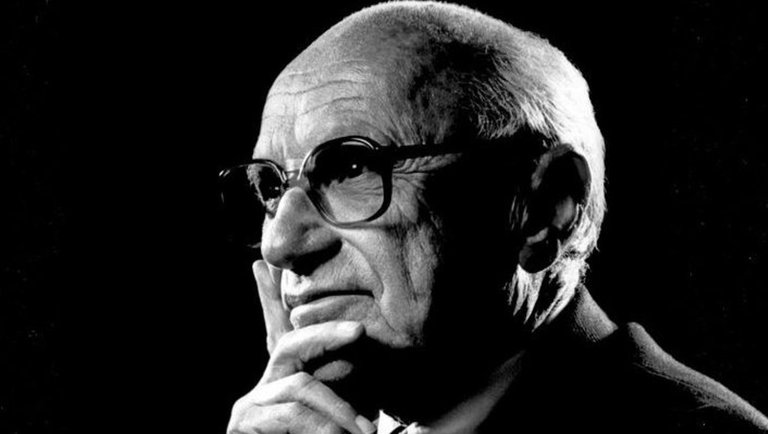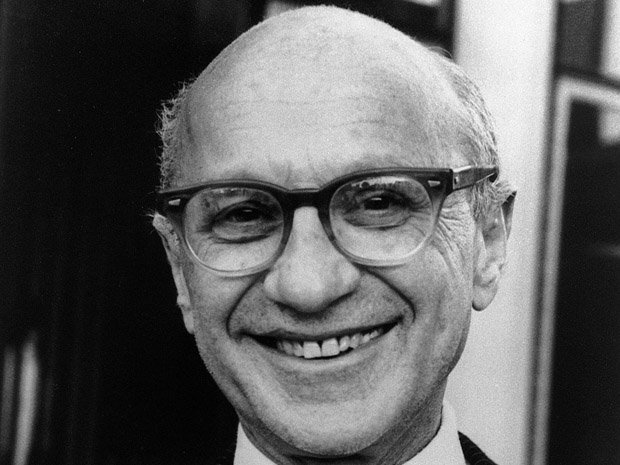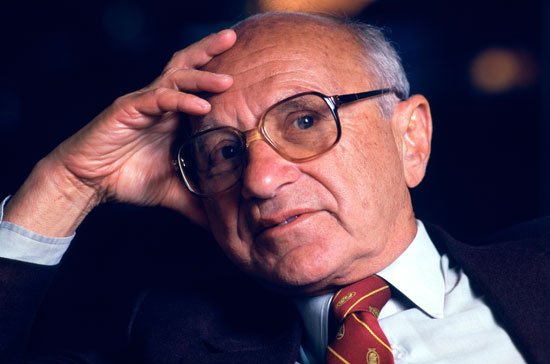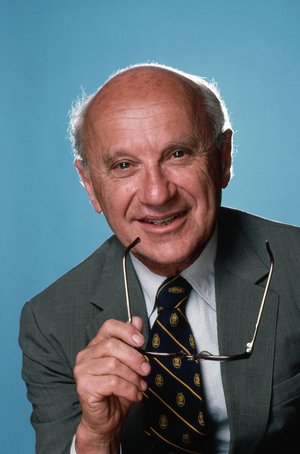How can an economist be a freedom fighter? This question was posed to me last week at the Libertarian National Convention. The person who I was discussing this series with meant well. I am sure when they think of freedom fighters, the image of Samuel Adams or Geronimo arise in their mind. To be sure, those are freedom fighters. To many, the image of an aged man, dressed in a suit, sitting in a blue chair before a studio audience takes little courage. I disagree; all activists find their own way.

Speaking truth to a submissive populace can be more influential and certainly more peaceful. Milton Friedman brought his Nobel Prize winning economic ideas to the American people at a time when the free market was considered fringe and was not only unpopular, but viewed by the public who were brainwashed to accept collectivist and socialist ides, as uncaring and selfish. Friedman made the topic of capital and finance fun and witty. Without his charismatic voice, the new popularity of both the Chicago school of economics and the Austrian school would not have enjoyed the resurgence they do today. The prevailing economic thought of Libertarians would be non-existent; the economic voices of the past and future would be shared unto deaf ears. Ron Paul, Adam Kokesh, Tom Woods, and scores of other free market thinkers would not be welcomed with the reception they do without those Donahue interviews in the late 70’s and early 80’s.
Milton Friedman was born July 31st 1912, at a time when the prevailing economic and political climate was decidedly on the side of more government. Keynesian economics had begun to be the dominant economic school of thought. This school is complicated and argues for more government involvement and more restrictions. Friedman would be one of the opposing voices to this school. His first book, “Capitalism and Freedom,” would be published in 1962. In this book, Friedman would join the chorus of opposition to a controlled economy alongside Ludwig Von Mises, Friedrich Hayek, and Murray Rothbard. Though Friedman would have slightly different opinions than these great economists, they would all agree that the State harmed the economy far more than it helped.
John Maynard Keynes is the most influential economist of the 20th century. How could he not be? His theories and opinions give more power to government and allow those governments to spend other people’s money without any thought of responsibility. The common sense approach of Adam Smith, Friedman’s biggest influence, puts the economic power into the hands of the people. To read more about Adam Smith here is my Steemit post-
https://steemit.com/economics/@adamkokesh/ethics-and-economics-adam-smith-forgotten-freedom-fighters

Friedman’s belief in personal freedom is obvious in his economic beliefs. He felt that government was an impediment to freedom.
“A major source of objection to a free economy is precisely that it ... gives people what they want instead of what a particular group thinks they ought to want. Underlying most arguments against the free market is a lack of belief in freedom itself.”
On topic after topic, Friedman sides with more freedom and less government. When it comes to the socialist idea of equality, he has these things to say: “A society that puts equality before freedom will get neither. A society that puts freedom before equality will get a high degree of both.” Or “One of the great mistakes is to judge policies and programs by their intentions rather than their results.”
Responding to criticism that a free market is greedy he said:
“Well first of all, tell me: Is there some society you know that doesn’t run on greed? You think Russia doesn’t run on greed? You think China doesn’t run on greed? What is greed? Of course, none of us are greedy, it’s only the other fellow who’s greedy. The world runs on individuals pursuing their separate interests. The great achievements of civilization have not come from government bureaus. Einstein didn’t construct his theory under order from a bureaucrat. Henry Ford didn’t revolutionize the automobile industry that way. In the only cases in which the masses have escaped from the kind of grinding poverty you’re talking about, the only cases in recorded history, are where they have had capitalism and largely free trade. If you want to know where the masses are worse off, worst off, it’s exactly in the kinds of societies that depart from that. So that the record of history is absolutely crystal clear, that there is no alternative way so far discovered of improving the lot of the ordinary people that can hold a candle to the productive activities that are unleashed by the free-enterprise system.”
Arguing that the best way to stop racial inequality is through the free market he said: “The great virtue of a free market system is that it does not care what color people are; it does not care what their religion is; it only cares whether they can produce something you want to buy. It is the most effective system we have discovered to enable people who hate one another to deal with one another and help one another.” This argument echoes Adam Smith. Both of these great economists argued that the freer the economy the more ethical the people are.

As for the drug war, this was his opinion: “Now here's somebody who wants to smoke a marijuana cigarette. If he's caught, he goes to jail. Now is that moral? Is that proper? I think it's absolutely disgraceful that our government, supposed to be our government, should be in the position of converting people who are not harming others into criminals, of destroying their lives, putting them in jail. That's the issue to me. The economic issue comes in only for explaining why it has those effects. But the economic reasons are not the reasons”
To some people in the Freedom Movement, Milton Friedman is a Republican. I agree, I would just point out that so was Ron Paul. In his own words he said, "I am a libertarian with a small 'l' and a Republican with a capital 'R.' And I am a Republican with a capital 'R' on grounds of expediency, not on principle." The influence of Milton Friedman upon both Ronald Reagan and Margaret Thatcher was enormous. As a Voluntaryist, I am not a huge fan of any president or prime-minister, but these two leaders were certainly better than any that have followed them in either Great Britain or the United States. It was Friedman who made a freer economy popular in these circles. I may not agree with either of those leaders, but I refuse to tear down pro freedom ideas.
To some degree, I suppose Milton Friedman has a special place in my heart. Shortly after discovering Ron Paul, I looked deeper into the economic ideas that he preached and the first person I found was this witty old man talking to Phil Donahue. I loved watching him put the socialist talk show host in his place with charm and style. Sure, I have gone on to like some of those other economists I mentioned above, but I can’t help but love Friedman.
Freedom Fighters fight their own battles. Sometimes they fight like Geronimo did with a weapon, sometimes they fight with words like Thomas Paine, sometimes they fight with their lives like the Burning Monk, and Milton Friedman fought with economics and a knowing smile that endeared him to millions of people. His courage to stand and give his opinion made him the second most popular economist in the past century, and his opinions were in direct conflict with government. His legacy can be found on television, both on Donahue and his own program called “Free to Choose,” based on the ideas in his second book by the same name. His approachable style made the complex simple and that is key in our fast paced culture.

In another conversation I had recently, someone pointed out that Friedman was more of a Minarchist than I am. My answer to them was, “yes he was, but he was born in 1912, and I have no doubt that were he my age he would be standing right beside me, supporting Adam Kokesh for president in 2020.” For proof of this I do not have to look far. This quote is from the introduction of his first book “Capitalism and Freedom,” and puts Friedman’s philosophy in line with Adam Kokesh, with his focus on localization. He said there are two principles that preserve our liberty. First, he says that governmental power must be limited.
“The second broad principle is that government power must be dispersed. If government is to exercise power, better in the county than the state, better in the state than in Washington. If I do not like what my local community does, be it in sewage disposal, or zoning, or schools, I can move to another. If I do not like what Washington imposes, I have few alternatives in this world of jealous nations.
The very difficulty of avoiding the enactments of the federal government is of course the great attraction of centralization to many of its proponents. It will enable them more effectively, they believe, to legislate programs- as they see it- that are in the interest of the public, whether it be the transfer of income from the rich to the poor or from private to governmental purposes. They are in a sense right. But this coin has two sides. The power to do good is also the power to do harm; those who control the power today may not tomorrow; and, more important, what one man regards as good, another may regard as harm.”
By @marcus.pulis (Press Secretary)
Sources
Capitalism and Freedom, Milton Friedman
Free to Choose, Milton Friedman
"Evading the difference between production and looting, they called the businessman a robber. Evading the difference between freedom and compulsion, they called him a slave driver. Evading the difference between reward and terror, they called him an exploiter. Evading the difference between pay checks and guns, they called him an autocrat. Evading the difference between trade and force, they called him a tyrant. The most crucial issue they had to evade was the difference between the earned and the unearned."
Ayn Rand, For the New Intellectual, 40
Government seems to attract power-hungry individuals, criminals, or fundamentalist ideologues. That is why it is so destructive. Who wants to rule over other people other than a slaver personality?
Get free votes! toolsfree[DOT]info/votes
One more thing I want to note. What I am saying here is hardly original, Milton already told him all of this in '98 about Hayek, It looks like the man refused to listen.
The global economy is really very big
A great article explaining a great economy
Thank you for the great explanation
And privileged information
@adamkokesh like you rightly put - every freedom fighter has their own field of battle. Nothing stops anybody from demanding freedom from the systematic oppressors
Am also an economist and an activist so I can totally relate to that
No, he'd be seated right alongside those other other A-listers within the party.
WARNINGCONFIRMED SCAM!
DO NOT FOLLOW any instruction and DO NOT CLICK on any link in the comment! - The message you received from @tatausahamb is a
For more information about this scam, read this post:
https://steemit.com/steemit/@arcange/phishing-site-reported-autosteemer-dot-com https://steemit.com/steemit/@arcange/phishing-site-reported-autosteemer-dot-club https://steemit.com/steemit/@arcange/phishing-site-reported-autosteem-dot-info
If you find my work to protect you and the community valuable, please consider to upvote this warning or to vote for my witness.